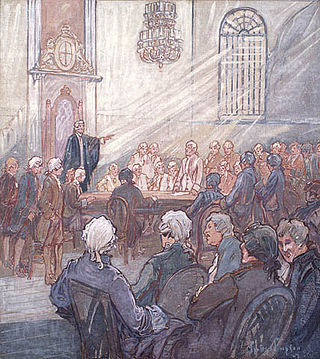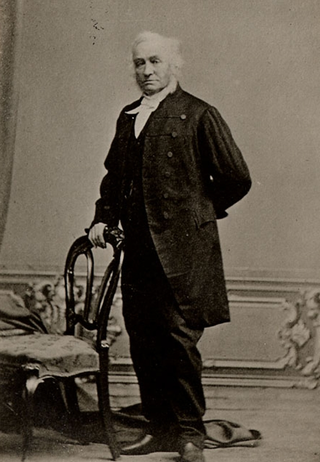
This section of the Timeline of Quebec history concerns the events in British North America relating to what is the present day province of Quebec, Canada between the time of the Constitutional Act of 1791 and the Act of Union 1840.

John Neilson was a journalist, publisher and politician in Lower Canada. Born in Scotland, he emigrated to Lower Canada in 1791 at age 15, to work in his older brother's publishing company in Quebec City. On his brother's death a few years later, he inherited the business. Neilson became one of the leading publishers and booksellers in Lower Canada and in Upper Canada, selling books in both French and English. He was the editor of the newspaper La Gazette de Québec / The Quebec Gazette, published in French and in English.

The Legislative Assembly of Upper Canada was the elected part of the legislature for the province of Upper Canada, functioning as the lower house in the Parliament of Upper Canada. Its legislative power was subject to veto by the appointed Lieutenant Governor, Executive Council, and Legislative Council.

The Legislative Council of Upper Canada was the upper house governing the province of Upper Canada. Modelled after the British House of Lords, it was created by the Constitutional Act of 1791. It was specified that the council should consist of at least seven members. Members were appointed for life but could be dropped for non-attendance. The first nine members of the council were appointed on 12 July 1792. The speaker was usually the Chief Justice of the Court of King's Bench. The Legislative Council was dissolved on 10 February 1841 when Upper and Lower Canada were united into the Province of Canada. Some members were reappointed to the Legislative Council of the united Province.

The Legislative Assembly of Lower Canada was the lower house of the bicameral structure of provincial government in Lower Canada until 1838. The legislative assembly was created by the Constitutional Act of 1791. The lower house consisted of elected legislative councilors who created bills to be passed up to the Legislative Council of Lower Canada, whose members were appointed by the governor general.

Edward Hale, D.C.L. was a Quebec businessman and political figure. He was Chancellor of Bishop's University and a significant figure to Bishop's College School.

James Leslie was a Canadian businessman and political figure. An immigrant from Scotland in 1804, he became a successful Montreal businessman and was one of the founders of the Bank of Montreal.
Stephen Sewell Foster was a physician and political figure in Canada East.

Henry Black, Q.C., LL.D. (hon.c.) was a lawyer, political figure, and judge in the Province of Canada, and later in the province of Quebec. He was the judge in the Court of Vice-Admiralty for the Quebec City district for most of his adult life. During that time, he was briefly a member of the Special Council which governed Lower Canada following the Lower Canada Rebellions of 1837 and 1838. He also served one term in the Legislative Assembly of the Province of Canada, as a member for Quebec City.
Amable Berthelot was a Canadien lawyer, author and political figure. He was elected to the Legislative Assembly of Lower Canada and later to the Legislative Assembly of the Province of Canada. Trained as a lawyer, he was an avid book-collector, at one point having a personal library of some fifteen hundred volumes. He did not support those who took up arms during the Lower Canada Rebellion of 1837–1838. He never married, but adopted two children, a boy and a girl. His daughter married Louis-Hippolyte LaFontaine, later co-premier of the Province of Canada. He was a literary mentor to François-Xavier Garneau.

Jonathan Sewell was a lawyer, judge, defensive spymaster and political figure in Lower Canada. Sewell utilized the idea of substantive law over procedural law as much as possible when it came to delegating punishment for criminal cases specifically; Sewell saw the certainty of punishment over the seriousness of punishment as enough to alter the intentions of non-violent or non-hardened criminals. In civil suits, Sewell "likely did more than anyone to professionalize the administration of civil justice prior to the codification of civil laws in 1866."
The Special Council of Lower Canada was an appointed body which administered Lower Canada until the Union Act of 1840 created the Province of Canada. Following the Lower Canada Rebellion, on March 27, 1838, the Constitutional Act of 1791 was suspended and both the Legislative Assembly and Legislative Council were dissolved.

Sir James Stuart, 1st Baronet of Oxford was a lawyer, judge, and political figure in Lower Canada.
Henry Hague Judah,, was a lawyer, businessman, and political figure in Canada East, Province of Canada. Judah was one of the first Jews to become a lawyer in early Canada, and the first Jewish member of the Parliament of the Province of Canada. He had an extensive legal practice, starting in Trois-Rivières, and later in Montreal. He was a member of the commission which implemented the abolition of seigneurial tenure in Lower Canada. He also was involved in banking, eventually becoming the president of the Montreal City and District Savings Bank, and was a promoter of the short-lived Montreal and Bytown Railway Company.
David Morrison Armstrong was a merchant, insurance agent and political figure in Canada East in the Province of Canada. He represented the electoral district of Berthier in the Legislative Assembly of the Province of Canada from 1841 to 1851. From 1855 to 1867 he sat in the Legislative Council of the Province of Canada, and in the Legislative Council of Quebec from 1867 until his death. He initially opposed the union of the Lower Canada and Upper Canada into the Province of Canada, and supported the reform movement for responsible government. After responsible government was achieved, he gradually became a Conservative.

Antoine-Charles Taschereau was a government official, land developer, and political figure in Lower Canada and Canada East, Province of Canada. He represented Beauce in the Legislative Assembly of Lower Canada from 1830 to 1838, sometimes voting with the government and sometimes with the Parti patriote, including voting for the Ninety-Two Resolutions. He opposed the union of Lower Canada and Upper Canada into the Province of Canada. Following the union, he represented Dorchester in the Legislative Assembly of the Province of Canada from 1841 to 1844, as an anti-unionist and member of the French-Canadian Group.
John Robinson Hamilton, QC was a lawyer and political figure in Lower Canada and then the Province of Canada. He represented the electoral district of Bonaventure 1832 to 1834 in the Legislative Assembly of Lower Canada. Following the creation of the Province of Canada, he again represented Bonaventure from 1841 to 1844 in the Legislative Assembly of the Province of Canada. He opposed the union of Lower Canada and Upper Canada into the Province of Canada, and supported the reform movement, which favoured responsible government.

The Parliament of Upper Canada was the legislature for Upper Canada. It was created when the old Province of Quebec was split into Upper Canada and Lower Canada by the Constitutional Act of 1791.

Robert Jones was a political figure in Canada East, in the Province of Canada. He represented Missiskoui in the Legislative Assembly of the Province of Canada from 1841 to 1844. He also served as a member of the Legislative Council of Lower Canada from 1832 to 1838 and the Legislative Council of the Province of Canada from 1849 to 1850.
The Honourable John Hale was a member of the Legislative Council of Lower Canada.